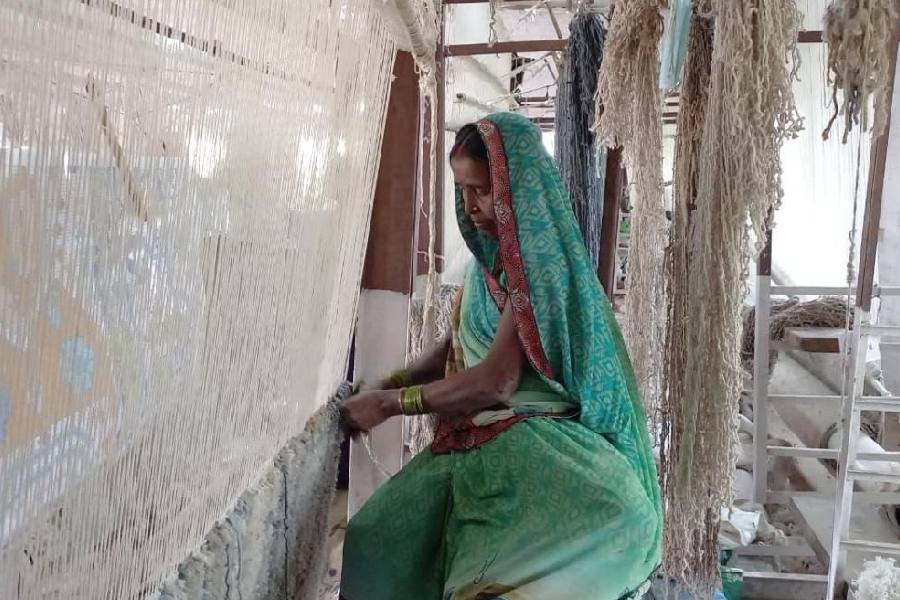Rukaiyah Begum, 30, has been weaving carpets for the past 10 years, earning ₹9,000 to ₹11,000 a month. As she trimmed the fur on the surface of a carpet for uniformity on Thursday, one question gnawed at her: how long would she continue to get work?
“The factory employee who brought the woven carpets to me for trimming told me demand has plummeted in the US. He said if there was no demand, there would be no need for production. We don’t want to work in anybody else’s agricultural field, but that will be the only option left if we don’t get carpet projects,” she told The Telegraph from behind a wall.
Her husband, wool shop worker Liaqat Ali, who was standing outside the house, chipped in: “Maybe the carpets woven or shaped by us are laid at US President Donald Trump’s residence, but I don’t want her to go out. She is also comfortable working from home. Let us see what happens.”
Trump’s punishing tariff of 50 per cent on India has hung a cloud of uncertainty on the handmade carpet industry, heavily reliant on exports to the US as there is hardly any local demand. India’s carpet industry, which has an annual turnover of ₹17,740 crore, has its epicentre in Bhadohi. The east Uttar Pradesh district accounts for 60 per cent of the business and has an equal share in exports.
As much as 60 per cent of the carpets manufactured in India are exported to the US and around 38 per cent to Europe. Domestic consumption accounts for only 2 per cent.
People associated with the carpet industry in Bhadohi said fresh orders from the US had dried up. Carpets worth ₹3,000 crore are ready while rugs worth another ₹3,000 crore are already half-done. Traders first make the carpets and then scout for orders, which has made the lack of demand even more debilitating. People associated with the industry in Bhadohi said factories would shut down and around 20 lakh people in the district and its neighbourhood would be affected if the situation did not improve.
Bhadohi, along the Varanasi-Allahabad highway, had been fearing a crisis ever since the US imposed the steep tariffs. Besides Bhadohi, the handmade carpet industry also has a presence in Rajasthan’s Jaipur, Panipat in Haryana, Jammu and Kashmir, Agra and Shahjahanpur in west Uttar Pradesh. Carpets are also produced in Mirzapur, Varanasi, Jaunpur and Chandauli, all bordering Bhadohi.
Bhadohi, also known as the “carpet city”, exports 98 per cent of its carpets.
“When India didn’t produce even a pin, it produced carpets (in medieval times) in Bhadohi. Eventually, it grew to become an industry with an annual turnover of ₹17,740 crore. But we will not be able to produce carpets if we have to pay 50 per cent tariff to the US, which is our most important market,” Aslam Mahboob, former secretary of the All India Carpet Manufacturers’ Association (AICMA), told this newspaper at his workshop in Bhadohi.
“We have stopped buying yarn and other items required to make carpets and won’t be able to provide jobs to the workers for long. Produced rugs are piling up in the godowns. The carpets that we have dispatched for the US are awaiting the green signal from importers at Mumbai port,” he added.
Mahboob said about 80 per cent of Bhadohi’s population was engaged in carpet weaving. “Ninety per cent of them work from home while the rest come to the workshops of the manufacturers. There are over 10 lakh carpet weavers in Bhadohi, which is half of the total number of people working in the industry in east UP. Their survival will become difficult if this situation persists,” he said.
“The central government can keep having differences with America and deal with them in whatever way they want to, but they must give us a bailout package so that we can survive. Otherwise, the entire ecosystem of this area is going to collapse. Other carpet-producing countries are already trying to grab India’s share in the global trade. It will take us two-three years to get back our position if they succeed,” Mahboob said.
Ravi Patodia, another carpet manufacturer, said: “I have been in the carpet trade for 40 years and this is the first time I am feeling we shouldn’t depend so heavily on America.”
Kuldeep Raj Wattal, chairman of the Carpet Export Promotion Council, a central government outfit with an exhibition centre in Bhadohi, has written to textile minister Giriraj Singh about the impending crisis.
“The sudden and steep tariff hike is expected to cause loss of price competitiveness, shifting orders to countries like Pakistan and Afghanistan in the low-end hand-knitted handloom and hand-tufted carpets, and to Turkey and China in the machine-made segment,” the letter said.
Wattal said it would “lead to mass unemployment among weavers and artisans in rural and semi-urban areas” and “distress migration”.
“Once they (workers) leave, most will not return, leading to the collapse of traditional carpet-weaving clusters. This will wipe out generations-old craft skills and weaken rural economies,” he said.
AICMA secretary Piyush Baranwal said: “Over 98 per cent of Bhadohi’s production is exported. It is a labour-intensive industry, of which 20 per cent are women.”
“There are about 28 phases, including procurement of wool, weaving, washing, packaging and shipping, before a carpet reaches its destination. Our money is scattered in all these processes and we need some stability here,” he said.










